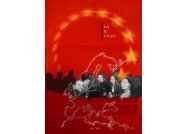turkish-greek civic dialogue - AEGEE Europe
turkish-greek civic dialogue - AEGEE Europe
turkish-greek civic dialogue - AEGEE Europe
You also want an ePaper? Increase the reach of your titles
YUMPU automatically turns print PDFs into web optimized ePapers that Google loves.
144<br />
Moreover, the order of the regime “about the re-establishment of a single<br />
language”, that substantially was the prohibition of the speech of any other<br />
language than Greek, included of course the prohibition of the speech of the<br />
Turkish language. Despite all these efforts, a lot of people, mainly women that<br />
came from Pont in relatively older age (above 15-20 years), did not ever learn<br />
the Greek language. However, the language was not related with some myth<br />
of different origin than that of the rest of the Greeks. It did not create ever<br />
a powerful nationality bond. On the contrary, the language functioned more<br />
as a default that should be eliminated if they wanted to feel satisfaction and<br />
pride for their identity. Thus, the result was that, today, the third generation<br />
of Turkish-speaking people of Pont ignores completely the Turkish language,<br />
and, in certain cases, it ignores even the fact that the previous generations<br />
were Turkish-speaking.<br />
However, if for the language that they spoke they could accept the charges, for<br />
their faith in the Orthodox Christian religion they did not allow any doubt. The<br />
intense projection of their religiosity constitutes, inter alia, a rational strategy<br />
of a team that concerns for its past as much as for its future.<br />
Summarising, the identity of the Pont’s Turkish-speaking inhabitants was shaped<br />
basing, from the one side, on the sense of common past and, from the other<br />
side, on the particular characteristics of their integration in the Greek national<br />
main part. The ignorance of Greek language and the speech of Turkish language<br />
were one of these particular elements that contributed in the strange way of<br />
integration of this particular team in the national state.<br />
Up to the Second World War, their political identity did not differ from the<br />
majority of the refugees of Northern Greece and, generally, of the country.<br />
The Second World War, German, Italian and Bulgarian possession will change<br />
dramatically the fate of this demographic team. Here, however, another story<br />
begins.<br />
WHEN THE EAST CEASED TO<br />
INSPIRES SONNETS<br />
.......................................................................................... Demosthenes Kourtovik<br />
*The impact of the Minor Asia destruction in the Greek prose<br />
The Greek-Turkish war of 1919-22 in the Minor Asia and the consequent<br />
exit of populations to and from Greece convulsed the Greek society; their<br />
consequences were dramatic and permanent. Almost one and a half million<br />
of seedy refugees was added in the population of a small and poor state,<br />
while roughly half million, Muslim mainly, but also Bulgarian speaking people,<br />
followed the reverse way. Apart from the ethnological composition, the social<br />
structure of the country changed deeply as well.<br />
How did the Greek literature record, how did it process and did it interpret<br />
these events?<br />
The writers are focused mainly in the drama of Greeks of Minor Asia after<br />
the defeat of 1922 or depositing his personal experience, as in Ilias Venezis’<br />
Number 31328 (1931), or recording the oral narration of others, as in Stratis<br />
Dukas’ A Prisoner’s Story (1929). However, we should not forget that to these<br />
texts Greeks speak that, as they admit repeatedly in their narration, they had<br />
lived until then peacefully with Turks. It’s remarkable that half a century later,<br />
in 1978, when this book was transported in the cinema by Nikos Koundouros<br />
entitled as 1922, the mood was totally different. Here all Greeks are innocent<br />
victims and all Turkish cruel beasts. Of course, the Turkish invasion in Cyprus<br />
was very fresh then and the film had a clear political target.<br />
In the decade 1960 a second wave of literary texts comes, mainly novels that<br />
refer to those incidents. These books are also written by authors of Minor Asia<br />
origin, the same generation with those of the first wave. The majority among<br />
them have a left orientation. The peaceful living together with Turks before<br />
the expedition in Minor Asia is described with bigger emphasis than in the<br />
texts of the first phase. However, the most interesting difference is that now a<br />
political interpretation of destruction 1922 is attempted.<br />
* Ilias Venezis’ Number 31328 begins with the, ironic, proposal “1922. The East, always very sweet,<br />
for sonnet – or something like that”.<br />
Population Exchange Association des Etats Généraux des Etudiants de L’<strong>Europe</strong>







